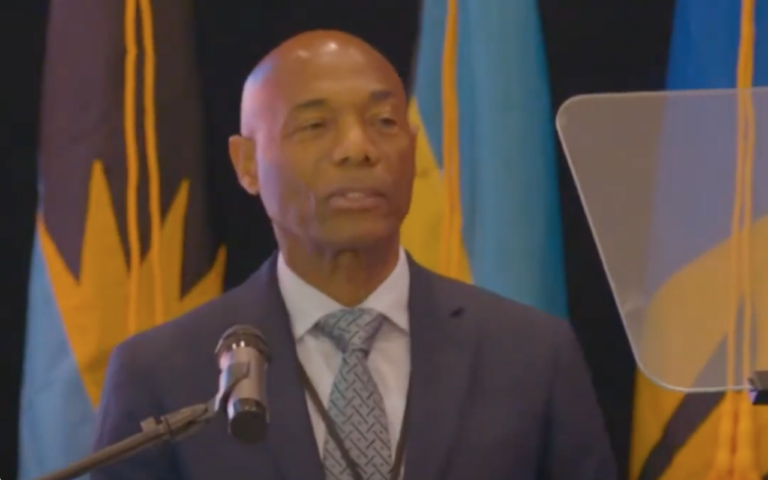
Sustainable economic recovery in Barbados and the rest of the region now hangs in the balance and will require up to US$200 billion over the next decade and acceleration of long-term development plans, says President of the Caribbean Development Bank (CDB) Dr Gene Leon.
However, he warned that the slow pace of implementation, lack of adequate financing options, and bottlenecks associated with the lengthy and bureaucratic processes were some of the issues that could hinder the needed progress if not urgently addressed.
Leon was speaking at the opening ceremony of the CDB’s 52nd annual meeting, which is being held in the Turks and Caicos Islands under the theme Measure Better to Target Better: Adaptation and Resilience.
“Many of our governments are now challenged to walk an economic tightrope, while at the same time trying to drive the development agenda. Essentially, sustainable recovery now hangs in the balance and the imperative to aggressively pursue resilience is even more urgent,” he said.
“We must be prepared to sprint fast like Shelly-Ann Fraser-Price of Jamaica and run long like Eliud Kipchoge of Kenya. That is to say, we must accelerate our development trajectory and we must be able to stay the course over the long haul. That is, development once started must be sustained.”
Reiterating his call for a holistic and inclusive approach to development with resilience and innovation at its core, Leon said the need for sustainable livelihoods, resilient economies, connectivity, and innovation were critical elements that should be pursued “expeditiously if we are to fundamentally alter the development path of the region and place our societies on a higher and more resilient sustainable welfare path in the future”.
He also indicated that if climate change remained unchecked, this could pose “an existential threat to the region”, adding that strong focus should also be placed on the advancement of food and nutrition, and energy and water security.
“The challenge before us is how best to navigate a safe path from legacy structural weaknesses to transformative development while maintaining debt sustainability, enhancing macroeconomic and financial stability, and building resilience against a myriad of shocks,” he noted, while acknowledging that the task ahead was not an easy one.
The economist warned that the full impact of the conflict in Ukraine on the region was yet to be felt and said that the associated prolonged uncertainty “necessitates that we proceed with even more haste to create the sustainable future that we envisaged for the region”.
He urged regional leaders to consider changing the target for the reduction of the Caribbean’s food import bill from 25 per cent by 2025, to 50 per cent by 2023.
Leon acknowledged that for progress to be made in the region’s development agenda, there was a need for improvements in several areas, including greater access to a suite of adequate and affordable financing instruments with specific terms, a strong regulatory environment and enabling environment, monitoring and evaluation systems, and effective implementation capacity.
“Without implementation capacity, all the good things that we talk about, all the money we seek to get will not bring us the results that we need. We need to address the implementation deficit in the region,” he urged.
“The implementation deficit looms large as possibly the most significant factor at the institutional, national, and regional levels that inhibits the ability of our countries to execute and maximise benefits from approved policies, projects, and programmes that seek to deepen regional integration and achieve our sustainable development goals
“We need to take decisive steps to address the bottlenecks impacting effective implementation including reforming the legislative framework to facilitate investment and innovation, improving processes to reduce bureaucracy and lengthy procurement processes, enhancing project and people management and skills for the future of work, encouraging a cultural change in mindset, embracing failure as the spur for your next success and a strong compliance culture, and moving from a project-based approach to a development continuum approach where monitoring, evaluation, adaptation, and nimbleness provide the thread linking projects to ultimate objectives,” the CDB boss added.
He said initial estimates by the Bank suggest that the scale of sustainable development envisaged for the region would require an investment of “upwards of US$100 billion over the next decade”.
Leon explained that sustainable energy projects alone across CDB borrowing member states would require investment of about US$40 billion while water and sanitation would require US$22 billion, transportation US$11.5 billion, agriculture and food security possibly US$13 billion, and digital transformation another US$12 billion.
He also indicated that to address issues relating to housing and poverty, the amount of required investment was an estimated US$10 billion annually, which would mean another US$100 billion over a ten-year period.
“Obviously our needs are humongous. How we are going to get there is the quintessential problem that we need to solve; hence, why next year we want to dedicate the entire year to access to adequate and affordable financing,” he said, adding that there will be a need for strategic partnerships with other development finance institutions to facilitate the finance required.
With some countries struggling with high debt, the CDB president said the private sector will also need to play a major role in delivering developmental outcomes and financing sustainable transformation and development in the region. marlonmadden@barbadostoday.bb
The post CDB boss: Recovery depends on ability to run economic sprints and marathons appeared first on Barbados Today.